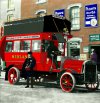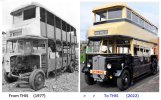paul stacey
master brummie
Quite true Richard!!
This is a real work of art and the cost is no surprise . It's one of the finest restorations well done to everyone.2nd July Gaydon
View attachment 171523View attachment 171524
prob the wheel nutsA fair bit of the original survives,
The oldest bus at Wythall Museum is this Tilling Stevens of 1913, one of the 30 taken over by the corporation from the Midland Red company shown as now alongside a colourised picture of it as new.Birmingham Corporation Transport The Buses 1913-1969 - Local Transport History
On the 19th July 1913, Birmingham Corporation exercised its limited powers under the Birmingham Corporation Act of 1903 (which provided for the running of omnibuses only during the construction or repair of, or as an extension to, a tramway route) to operate motorbuses as an extension to the...petergould.co.uk


looks like the one butler drove in on the busesThe oldest bus at Wythall Museum is this Tilling Stevens of 1913, one of the 30 taken over by the corporation from the Midland Red company shown as now alongside a colourised picture of it as new.
View attachment 171605
The Daimler book was apparently not completed and the project is on hold. That came from Amberley publishing.I have just acqùired thè late David Harvey's last booķ?,Birmingham s Crossley Buses, although a lot of the photos are dark,a lot are of interest, because of the background behind the buses, of Birmingham in the fifties and sixties. I questioned whether it is his last book, because in mid 2021, Amazon were advertising this for March and a similar title for Daimler for April. If you liked the Crossley, we'll worth looking at.
Bob
Mainly, yes. They had to charge a higher 'protective' fare for journeys wholly within the city boundary, some of which was forwarded to the corporation in lieu of lost revenue as a result of a famous agreement in 1914 between the Corporation and Midland Red. For details, refer to Post https://birminghamhistory.co.uk/for...ham-corporation-bus-history.13584/#post-98540 "1914 - Birmingham Corporation takes over Midland Red city routes"I don't ever remember riding on a Midland Red bus though, weren't
they for the longer routes out of town?
Thanks for that confirmation Lloyd. I knew nothing of the 'agreement' with the Corporation.Mainly, yes. They had to charge a higher 'protective' fare for journeys wholly within the city boundary, some of which was forwarded to the corporation in lieu of lost revenue as a result of a famous agreement in 1914 between the Corporation and Midland Red. For details, refer to Post https://birminghamhistory.co.uk/for...ham-corporation-bus-history.13584/#post-98540 "1914 - Birmingham Corporation takes over Midland Red city routes"
In 1960's lived on A41 Warwick Rd. On occasions if we were in a hurry to get into Brum and feeling affluent we would "request" the Solihull midland red to pick us up. Often however the drivers would fail to stop and we would need to use the regular BCT bus.Thanks for that confirmation Lloyd. I knew nothing of the 'agreement' with the Corporation.
When I joined the Midland Red as a driver in 1973, I was told by some of the older conductors, on inward bound services "Don't stop for 'Corpo' passengers inside the boundary". It was their laziness not to have to go round the bus again collecting fares. I didn't agree to this, and often would pick them up if hands went out in request, my excuse being that I didn't want to be hauled up 'in front of the gaffer' if a letter of complaint came in, quoting the registration of the bus I was driving at the time. It wasn't long before the conductors went, replaced by 'one man operated' buses to save the extra wage.In 1960's lived on A41 Warwick Rd. On occasions if we were in a hurry to get into Brum and feeling affluent we would "request" the Solihull midland red to pick us up. Often however the drivers would fail to stop and we would need to use the regular BCT bus.

Since last December. Details here: https://www.nationalexpressgroup.co...tional-express-hydrogen-buses-out-in-service/Birmingham’s Clean Air Hydrogen Bus -
are they in use now?
If such "clean" technology is available now. Why are they still persisting with the Digbeth metro extension with the utter chaos it is currently creating during it's construction and the metro will only ever be able to travel where tracks have been laid. The metro technology seems to me to be a quarter of century out of date. Am I so wrong?Since last December. Details here: https://www.nationalexpressgroup.co...tional-express-hydrogen-buses-out-in-service/
No, you aren't. The problem is, public transport is 'run' by politicians now, who have no understanding of its requirements. 'Clean' buses, hydrogen, electric (trolleybus, rechargeable battery or even bi-mode where engines are only run out of urban areas) have long been available technologies, but without commitment from operators to fund design and purchase, no development will be made. 'Metro' (Tram to those of us who remember them) is a continental thing, so got EU funding. That isn't there now, but will 'those in power' see the way to changing their minds? No, because that would mean saying they were wrong in the first place. The only way to succesfully promote public transport is to make it free (i.e. funded from taxation - nothing is 'free'!) which is about the only incentive to get people out of their cars and onto the bus. And for those who will wail "It can't be done!" - read this: https://www.mobiliteit.lu/en/tickets/free-transport/If such "clean" technology is available now. Why are they still persisting with the Digbeth metro extension with the utter chaos it is currently creating during it's construction and the metro will only ever be able to travel where tracks have been laid. The metro technology seems to me to be a quarter of century out of date. Am I so wrong?
No…Yor are correc!If such "clean" technology is available now. Why are they still persisting with the Digbeth metro extension with the utter chaos it is currently creating during it's construction and the metro will only ever be able to travel where tracks have been laid. The metro technology seems to me to be a quarter of century out of date. Am I so wrong?
Didn't Sheffield have free or was it very inexpensive bus transport in 1980's. We pensioners have our passes!Having said that, I have just seen Lloyd's post and agree that the ideal solution is free transport.
The pensioner pass is of little use if there are no buses. The only way to make buses viable in rural areas is to subsidise them. That used to be achieved by cross subsidy from well used routes. Cross subsidy was stopped in order to deliver contracted out services and destroy local authority control.Quite a proportion of bus revenues must come from pensioners passes. Quite a proportion of bus revenues must come from our ancient codgers passes. Of course they are not useable in early rush times., which probably must cover a lot of the passenger's journeys
Pensioners passes can be used at anytime, however, when used "out of hours" a £1 charge is made for any journey. John.Quite a proportion of bus revenues must come from pensioners passes. Quite a proportion of bus revenues must come from our ancient codgers passes. Of course they are not useable in early rush times., which probably must cover a lot of the passenger's journeys
My mom tried to get tokens for me to go from St Wilfreds Hodge Hill to St Wilfred Martineau 3 buses 56 Castle Brom to Fox then the 11 then the 14 , but she could not get them as journey was not long enough as they calculated as the Crow flys, so had to go to Hodge Hill Comp, and to this day never seen or met any of my class mates since i left 52 years ago
